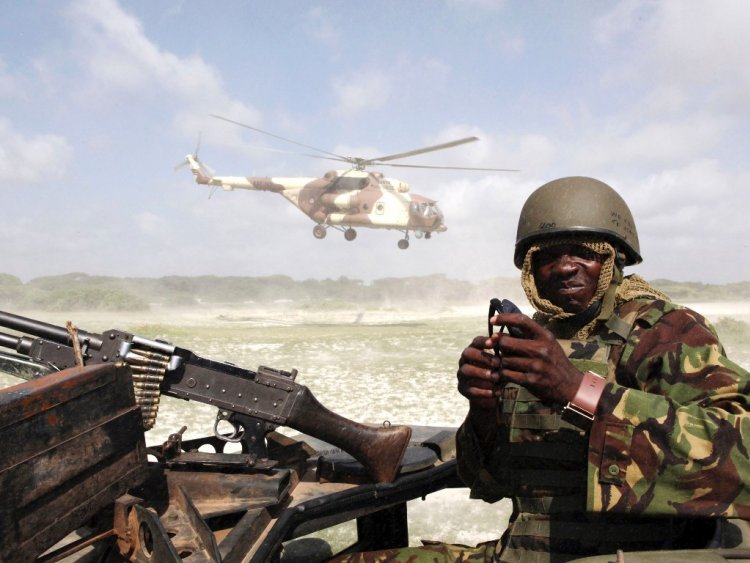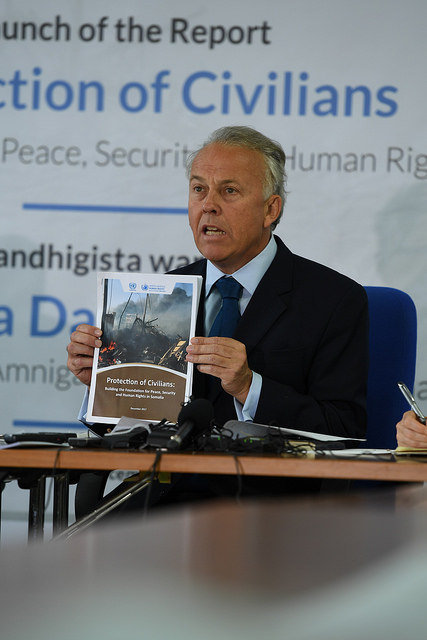Tug of war as Amisom and Kenya dismiss UN report on civilian casualties

Kenya says some of the report findings could be construed to advance Al-Shabaab propaganda while Amisom terms it as containing significant misrepresentations

Amisom and Kenya have denied they killed or violated rights of civilians in Somalia following a UN report which lays blame on the two parties for 131 civilian deaths between January 2016 and October this year.
In their rejoinders to the UN in Somalia (UNSOM) UN Human Rights Office, joint authors of the report, Kenya and the African Union force Amisom have dismissed various accusations terming them as either fabricated on based on inconclusive evidence.
Amisom boss Francisco Madeira tore into the report findings which point accusing fingers on his troops of killings, extrajudicial killings and sexual violations.
“We are of the view that this particular report contains significant misrepresentations of certain incidents that took place in Somalia as they pertain to Amisom operations and that expected good faith may not have been exercised in some of the deductions that were made in the report,” said Madeira in his response dated December 8, 2017.
IT IS SHAMEFUL
The report which documented 4,585 civilian casualties (2,078 and 2,507 injured) was released December 10, 2017 to coincide with the UN Human Rights Day.
UN chief in Somalia Michael Keating noted civilians were continually paying the price in conflicts which would otherwise have been resolved politically and did not mince his words in admonishing actors in the conflict for doing little to address the situation.
“Parties to the conflict are simply not doing enough to shield civilians from the violence. This is shameful,” said Keating.
But Amisom does not agree with the UN on some of the findings. In one incident for instance, Madeira takes issue with allegations against the Ethiopian contingent under Amisom in Elbur in which the soldiers are accused of raping three minors aged 14 and 17 years. Amisom says it concluded following investigations that the incident never took place. The hospital (Halaane in Exqoxle town) cited by UNSOM did not exist, Madeira said.

Elbur in Galgadud region has largely remained under Al-Shabaab control for several years.
BLURRING IDENTITIES
Madeira has also refuted claims of blurring of identities between Amisom and non-Amisom forces as mentioned in the report. The report notes that these blurring presents challenges in documenting and attributing responsibility for allegations of violations committed.
“Whilst theoretically the concern of blurring of lines of attribution or responsibility is a possibility, however in practice, this has not been the case within Amisom operations in Somalia,” said Madeira.
The Amisom chief told the UN it did not have control over the activities of forces outside the mission’s command and therefore must be addressed by Somali government.
“The presence of non SNF (Somali National Forces) and non-Amisom forces in Somalia is a matter within the prerogative of the Somali state to which Amisom has not control.”
BAFFLED
The African Union force has also termed UN accusation that it was not taking steps to interview victims and witnesses in cases of human rights violations as ‘simply baffling’.
And in what sounds like a tug of war between Amisom, UN and Troops Contributing Countries (TCC), Kenya has denied having troops outside Amisom command despite Amisom acknowledgment of presence of non-Amisom TCC forces in the country.
In his rebuttal dated December 5, Kenya’s ambassador to Somalia Lucas Tumbo denies presence of Kenyan troops in the country operating outside Amisom command. This despite Amisom confirming variously presence of non-Amisom TCC forces in Somalia.
“The Republic of Kenya of Kenya does not have non-Amisom troops in the Federal Republic of Somalia. For a UN report to insinuate that Kenya has an occupational force in Somalia is not only incorrect, but very unfortunate, hence, need for this part of the report to be deleted forthwith,” said Tumbo.
PROPAGANDA
The report levels blame non-Amisom KDF for 42 casualties (36 killed and 6 injured) while KDF forces under Amisom killed four civilians and injured five others. It further notes non-Amisom KDF reportedly use their own air assets ‘making it more challenging to attribute responsibility caused by either of the two Kenyan forces.’
READ ALSO: IEDs account for highest civilian deaths in Somalia-UN report
At least 2,000 civilians killed in Somalia since 2016-UN report
UNSOM said it reviews reports on the use of Amisom air assets to determine whether the helicopters have flown in the area of the incident on the same date.
In dismissing the report findings, the Kenyan ambassador notes, ‘the report may be construed to advance Al-Shabaab and other terrorist groups’ agenda by demonizing counter-terrorism operations while vocalizing Al-Shabaab propaganda.’
Goobjoog News efforts to reach UNSOM for comment were not fruitful.